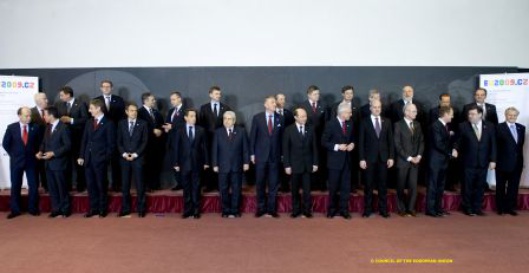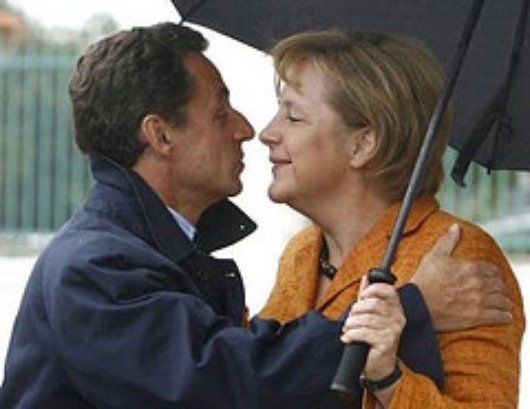A third Franco-German initiative is necessary to face the financial crisis
Published on
Article written by Guido Montani, Vice-President of the UEF, Professor of International Political Economy University of Pavia

The informal European Council of March 1st ended with the refusal of the countries of the Monetary Union to create a fund to help the Eastern European countries in difficulty. The German government is right to refuse indiscriminate aid, but is wrong in facing up to the more general issue of the European financial system and budget. The financial crisis is putting the cohesion of the Monetary Union to the test and, without adequate powers at European level, national governments, Germany above all, could be faced with the dilemma of having to finance the default of countries which are suffering from the crisis, such as Ireland, Greece, Hungary or Austria, or accepting the disintegration of the Monetary Union.
Source Le Conseil de l'Union européenne
Germany has already experienced a similar situation in the past, when it helped countries with a weak currency several times. After the founding of the Monetary Union the problem was solved. Today, a similar unitary solution is necessary. In the 70s, Giscard d’Estaing and Schmidt implemented the building of the European currency, with the European Monetary System. In 1991, in Maastricht, Mitterrand and Kohl gave life to the Economic and Monetary Union, but without reforming the European fiscal system. In 1997, Germany requested and obtained the Stability and Growth Pact. However, as the President of the European Central Bank, Trichet pointed out, “the Stability and Growth Pact is the legal framework that we have as a quid pro quo for the fact that we do not have a federal budget and a federal government”. Now, it is time for a third Franco-German initiative: it is necessary to give the European Union a federal budget and a federal government.
A federal budget is necessary because there are some European public goods – such as monetary and financial stability, sustainable growth, space exploration, etc. – which must be financed by European resources. Other public goods, of national importance – such as the welfare system – must be financed by national budgets. Other local public goods will be financed by a regional financial system. If the European Union cannot count on its own resources, in the case of a crisis, the stronger States of the Union will be obliged to carry out the role of “lenders of last resort”. The world economic crisis is increasingly getting worse day by day. There are two indispensable reforms that need to be implemented as soon as possible:
-
The ceiling of the European budget must be raised to at least 2% of the community GDP (as the McDougall report proposed) and the European Commission should be authorized to issue Union-Bonds, in order to finance a serious plan for the relaunching of European industrial production and for the ecological reconversion of the economy. Without a European Plan, national plans will end up fostering protectionism and causing the waste of public money. The increased European fiscal responsibility should be matched with increased political responsibility. A Minister for Economics and Finance should be appointed within the European Commission and a periodical report should be presented to the European Parliament.
-
An Interinstitutional Agreement – between the European Parliament, the Council and Commission – should be approved at the beginning of each European legislature. The Agreement must contain expenditure limits, such as the maximum level of indebtedness and of public deficit, and the total amount of European budgetary resources. The European budget must be financed with real European resources, therefore euro-taxes, as the European Parliament has proposed. This does not mean an increase in the citizens’ tax pressure, but a better sharing of financial resources between the national level and the European one.

If the French President, Mr Sarkozy, and the German Chancellor, Mrs Merkel, are able to take this step, the Economic and Monetary Union will be strengthened and Europe will be able to face the difficult phase of negotiations for the reform of the world financial and monetary system with a renewed impulse.
European citizens await a response from those who govern them.



